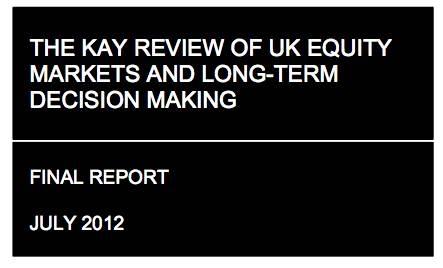The Government's Law Commission has published a consultation paper reviewing the "fiduciary duties" that apply to investment intermediaries following the Kay Review.
The paper traces a chain of intermediaries from an individual, saving for a pension, to the registered shareholder of a UK company. It looks at the obligations of those in the chain to act in the interests of savers.
The Commission's project arose out of the Kay Review of the UK equity market. Published in July 2012, the Kay Review criticised intermediaries for excessive trading on the basis of short-term share movements, rather than investing for the long-term.
In trust-based pensions, trustees must act in the interests of savers. The Law Commission sets out its initial view that the law does not prevent trustees from taking a long-term approach. Trustees may take account of environmental, social and governance issues, where these are relevant to risks and financial returns. But trustees should be careful to keep the purpose of the investment in mind, which is to provide a pension for the saver. The Law Commission says in its review that they should not attempt to make ethically motivated decisions or improve the world in some general sense, possibly at the expense of future pensioners.
{desktop}{/desktop}{mobile}{/mobile}
David Hertzell, the Law Commissioner leading the project, said: "There is mounting evidence that sustainable firms that treat their customers and suppliers well do better in the long term. Trustees are entitled to pick stocks on the basis of these factors, when they think that this will improve financial returns. But they should not make ethical choices that financially disadvantage savers, unless savers have given informed consent.
"We do not think that the pressures towards short-term trading come from the law. There are many other factors at play, including actuarial valuations. Many pension schemes are very small. They lack internal resources and depend instead on investment consultants and investment managers, who may recommend short-term trading because that is what everyone else is doing."
In its consultation, the Law Commission is asking whether the law has struck the right balance.
The Law Commission says that contract-based pension schemes do not have trustees and the law is much less certain. There are no clear legal duties on pension providers to act in the best interests of their members or to reassess the suitability of investment strategies over time. The Commission is seeking responses to its provisional view that the rules requiring contract-based pension providers to reassess the suitability of investment strategies over time should be clarified and strengthened.
In both trust-based and contract-based schemes, legal duties on their own may not be sufficient to ensure that pension schemes work in the interests of their members. The Commission says it has noted the work being carried out by the Department for Work and Pensions to improve the governance of pension schemes, and urges consultees to engage with this work.
Mr Hertzell said: "Judge-made laws, such as fiduciary duties, cannot make up for gaps in regulation. We think that there may be gaps in the way that investment consultants and custodians are regulated, and ask whether there is a need to review these areas."
The Law Commission is seeking views on its paper by 22 January.

